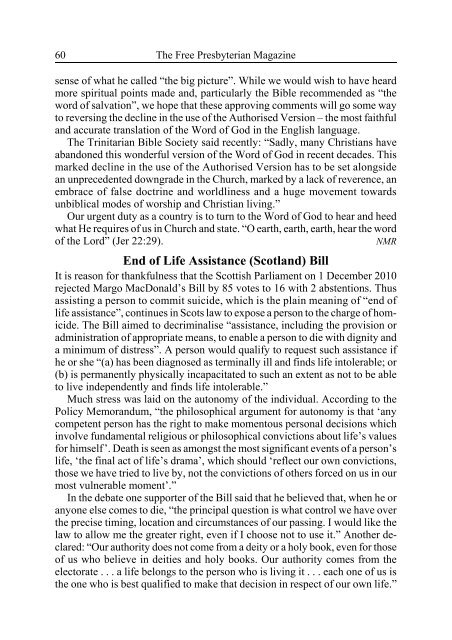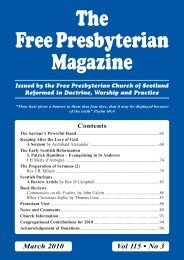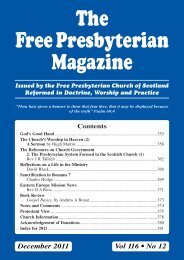February - the Free Presbyterian church of Scotland
February - the Free Presbyterian church of Scotland
February - the Free Presbyterian church of Scotland
Create successful ePaper yourself
Turn your PDF publications into a flip-book with our unique Google optimized e-Paper software.
60<br />
The <strong>Free</strong> <strong>Presbyterian</strong> Magazine<br />
sense <strong>of</strong> what he called “<strong>the</strong> big picture”. While we would wish to have heard<br />
more spiritual points made and, particularly <strong>the</strong> Bible recommended as “<strong>the</strong><br />
word <strong>of</strong> salvation”, we hope that <strong>the</strong>se approving comments will go some way<br />
to reversing <strong>the</strong> decline in <strong>the</strong> use <strong>of</strong> <strong>the</strong> Authorised Version – <strong>the</strong> most faithful<br />
and accurate translation <strong>of</strong> <strong>the</strong> Word <strong>of</strong> God in <strong>the</strong> English language.<br />
The Trinitarian Bible Society said recently: “Sadly, many Christians have<br />
abandoned this wonderful version <strong>of</strong> <strong>the</strong> Word <strong>of</strong> God in recent decades. This<br />
marked decline in <strong>the</strong> use <strong>of</strong> <strong>the</strong> Authorised Version has to be set alongside<br />
an unprecedented downgrade in <strong>the</strong> Church, marked by a lack <strong>of</strong> reverence, an<br />
embrace <strong>of</strong> false doctrine and worldliness and a huge movement towards<br />
unbiblical modes <strong>of</strong> worship and Christian living.”<br />
Our urgent duty as a country is to turn to <strong>the</strong> Word <strong>of</strong> God to hear and heed<br />
what He requires <strong>of</strong> us in Church and state. “O earth, earth, earth, hear <strong>the</strong> word<br />
<strong>of</strong> <strong>the</strong> Lord” (Jer 22:29).<br />
NMR<br />
End <strong>of</strong> Life Assistance (<strong>Scotland</strong>) Bill<br />
It is reason for thankfulness that <strong>the</strong> Scottish Parliament on 1 December 2010<br />
rejected Margo MacDonald’s Bill by 85 votes to 16 with 2 abstentions. Thus<br />
assisting a person to commit suicide, which is <strong>the</strong> plain meaning <strong>of</strong> “end <strong>of</strong><br />
life assistance”, continues in Scots law to expose a person to <strong>the</strong> charge <strong>of</strong> homicide.<br />
The Bill aimed to decriminalise “assistance, including <strong>the</strong> provision or<br />
administration <strong>of</strong> appropriate means, to enable a person to die with dignity and<br />
a minimum <strong>of</strong> distress”. A person would qualify to request such assistance if<br />
he or she “(a) has been diagnosed as terminally ill and finds life intolerable; or<br />
(b) is permanently physically incapacitated to such an extent as not to be able<br />
to live independently and finds life intolerable.”<br />
Much stress was laid on <strong>the</strong> autonomy <strong>of</strong> <strong>the</strong> individual. According to <strong>the</strong><br />
Policy Memorandum, “<strong>the</strong> philosophical argument for autonomy is that ‘any<br />
competent person has <strong>the</strong> right to make momentous personal decisions which<br />
involve fundamental religious or philosophical convictions about life’s values<br />
for himself’. Death is seen as amongst <strong>the</strong> most significant events <strong>of</strong> a person’s<br />
life, ‘<strong>the</strong> final act <strong>of</strong> life’s drama’, which should ‘reflect our own convictions,<br />
those we have tried to live by, not <strong>the</strong> convictions <strong>of</strong> o<strong>the</strong>rs forced on us in our<br />
most vulnerable moment’.”<br />
In <strong>the</strong> debate one supporter <strong>of</strong> <strong>the</strong> Bill said that he believed that, when he or<br />
anyone else comes to die, “<strong>the</strong> principal question is what control we have over<br />
<strong>the</strong> precise timing, location and circumstances <strong>of</strong> our passing. I would like <strong>the</strong><br />
law to allow me <strong>the</strong> greater right, even if I choose not to use it.” Ano<strong>the</strong>r declared:<br />
“Our authority does not come from a deity or a holy book, even for those<br />
<strong>of</strong> us who believe in deities and holy books. Our authority comes from <strong>the</strong><br />
electorate . . . a life belongs to <strong>the</strong> person who is living it . . . each one <strong>of</strong> us is<br />
<strong>the</strong> one who is best qualified to make that decision in respect <strong>of</strong> our own life.”

















